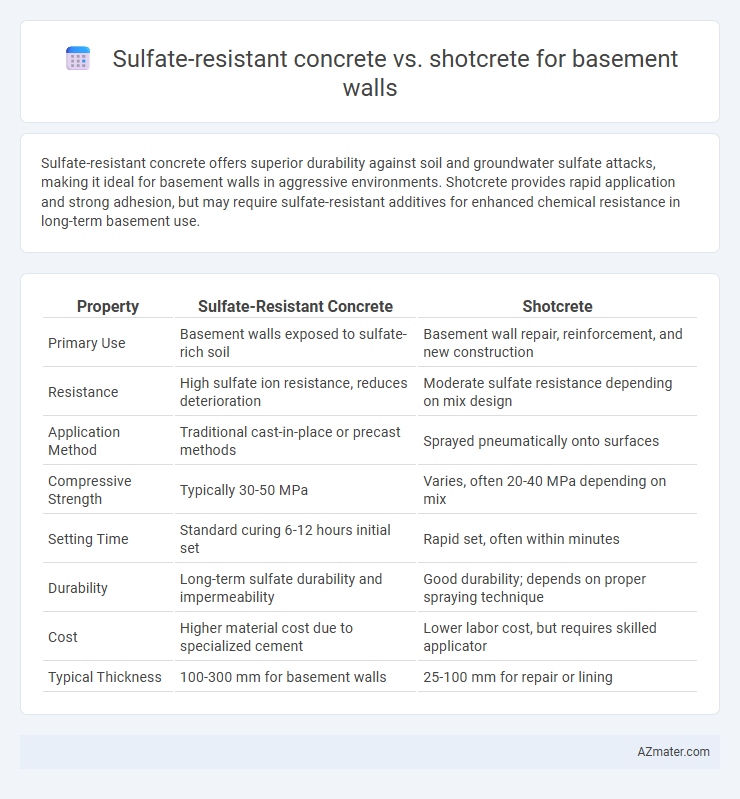Sulfate-resistant concrete offers superior durability against soil and groundwater sulfate attacks, making it ideal for basement walls in aggressive environments. Shotcrete provides rapid application and strong adhesion, but may require sulfate-resistant additives for enhanced chemical resistance in long-term basement use.
Table of Comparison
| Property | Sulfate-Resistant Concrete | Shotcrete |
|---|---|---|
| Primary Use | Basement walls exposed to sulfate-rich soil | Basement wall repair, reinforcement, and new construction |
| Resistance | High sulfate ion resistance, reduces deterioration | Moderate sulfate resistance depending on mix design |
| Application Method | Traditional cast-in-place or precast methods | Sprayed pneumatically onto surfaces |
| Compressive Strength | Typically 30-50 MPa | Varies, often 20-40 MPa depending on mix |
| Setting Time | Standard curing 6-12 hours initial set | Rapid set, often within minutes |
| Durability | Long-term sulfate durability and impermeability | Good durability; depends on proper spraying technique |
| Cost | Higher material cost due to specialized cement | Lower labor cost, but requires skilled applicator |
| Typical Thickness | 100-300 mm for basement walls | 25-100 mm for repair or lining |
Introduction to Basement Wall Construction
Basement wall construction requires materials that withstand moisture and soil chemistry, making sulfate-resistant concrete essential where sulfate-rich soils prevail. Sulfate-resistant concrete contains low C3A cement, reducing chemical reactions with sulfates and enhancing durability against aggressive environments. Shotcrete, a sprayed concrete alternative, offers rapid placement and strong adhesion but may need sulfate-resistant additives for comparable long-term sulfate exposure protection.
Overview of Sulfate-Resistant Concrete
Sulfate-resistant concrete is specifically formulated to withstand exposure to high sulfate concentrations commonly found in aggressive soil or groundwater, making it ideal for basement walls prone to sulfate attack. It utilizes low-permeability cement blends, typically Type V Portland cement or blends with supplementary cementitious materials like fly ash or slag, to minimize chemical degradation and extend the durability of structural elements. Sulfate-resistant concrete enhances resistance to expansion, cracking, and corrosion, ensuring a longer lifespan and reduced maintenance costs compared to conventional concrete or shotcrete in sulfate-rich environments.
Understanding Shotcrete Technology
Shotcrete technology involves applying concrete pneumatically at high velocity, ensuring dense compaction ideal for basement walls requiring rapid strength gain and durability. Unlike sulfate-resistant concrete formulated specifically to combat sulfate-induced chemical attacks, shotcrete allows for tailored mix designs, including sulfate-resistant variants, enhancing resistance against aggressive soil conditions. This method reduces labor and formwork costs while delivering superior adhesion and reduced permeability, crucial for long-term basement wall protection.
Chemical Resistance: Sulfate Exposure Concerns
Sulfate-resistant concrete exhibits enhanced chemical resistance by incorporating low C3A clinker and supplementary cementitious materials like fly ash or slag, significantly reducing sulfate ion penetration and deterioration in basement walls exposed to aggressive sulfate environments. Shotcrete, while versatile for structural applications, often lacks the tailored chemical composition necessary to withstand prolonged sulfate exposure unless specifically formulated with sulfate-resistant additives. Selecting sulfate-resistant concrete minimizes risks of expansion, cracking, and spalling caused by sulfate attack, ensuring greater durability and structural integrity of basement walls in sulfate-laden soils or groundwater conditions.
Application Methods: Cast-in-Place vs. Spray Application
Sulfate-resistant concrete is typically applied using cast-in-place methods, allowing for precise mixing and placement that ensures durability in aggressive sulfate environments. Shotcrete, on the other hand, is applied by spray application, which provides rapid installation and excellent adhesion to complex basement wall surfaces but may require skilled operators to achieve the desired density and sulfate resistance. The choice between cast-in-place sulfate-resistant concrete and spray-applied shotcrete depends on site conditions, required cure times, and the need for resistance against sulfate-induced deterioration.
Durability and Longevity in Basement Walls
Sulfate-resistant concrete offers superior durability for basement walls exposed to sulfate-rich soils, as its low C3A content minimizes chemical reactions that cause deterioration. Shotcrete, while versatile and quick to apply, may require additional protective measures to achieve comparable longevity in aggressive environments. For long-term basement wall performance, sulfate-resistant concrete provides enhanced resistance to sulfate attack, ensuring structural integrity and reduced maintenance over time.
Waterproofing Capabilities
Sulfate-resistant concrete offers superior protection for basement walls by preventing sulfate ion penetration, which enhances its waterproofing capabilities in sulfate-rich soil environments. Shotcrete, while providing excellent adhesion and structural reinforcement, may require additional waterproofing treatments to achieve similar resistance against water infiltration. Selecting sulfate-resistant concrete ensures long-term durability and moisture control crucial for basement wall waterproofing in aggressive soil conditions.
Installation Time and Labor Requirements
Sulfate-resistant concrete for basement walls typically requires longer installation time due to its specialized mix design and curing process, demanding skilled labor to ensure durability against sulfate attack. Shotcrete offers faster application since it is pneumatically sprayed directly onto surfaces, significantly reducing labor intensity and surface preparation time. Choosing shotcrete accelerates project timelines and lowers labor costs compared to the traditional placement and finishing of sulfate-resistant concrete.
Cost Comparison: Material and Construction
Sulfate-resistant concrete typically incurs higher material costs due to specialized cement additives designed to withstand sulfate exposure, while shotcrete often reduces labor expenses through faster application and minimal formwork requirements. Construction of sulfate-resistant concrete demands precise mixing and curing, increasing overall project timelines and associated costs compared to the quicker, spray-applied method of shotcrete. When balancing total expenses for basement wall solutions, shotcrete generally offers cost advantages in labor and installation, whereas sulfate-resistant concrete presents higher upfront material investment but enhanced durability in sulfate-rich environments.
Choosing the Best Solution for Your Basement
Sulfate-resistant concrete offers enhanced durability and longevity for basement walls exposed to high sulfate soils, effectively preventing sulfate attack and minimizing structural damage. Shotcrete provides a versatile, quick-application solution with excellent bonding properties, ideal for complex shapes and confined spaces in basement construction. Selecting between sulfate-resistant concrete and shotcrete depends on soil sulfate levels, structural requirements, and project timelines, ensuring optimal protection and performance for your basement walls.

Infographic: Sulfate-resistant concrete vs Shotcrete for Basement wall
 azmater.com
azmater.com